 Congratulations to BYU-Hawaii history professor Dr. Isaiah Walker on being awarded the Kenneth W. Baldridge Prize for his book, Waves of Resistance: Surfing and History in Twentieth-Century Hawai‘i. The prize was announced by the Hawai‘i chapter of the Phi Alpha Theta honor society at their annual regional conference held March 8 at the University of Hawai‘i’s Mānoa campus. The Baldridge Prize recognizes the best book in any field of history written by a resident of Hawai‘i.
Congratulations to BYU-Hawaii history professor Dr. Isaiah Walker on being awarded the Kenneth W. Baldridge Prize for his book, Waves of Resistance: Surfing and History in Twentieth-Century Hawai‘i. The prize was announced by the Hawai‘i chapter of the Phi Alpha Theta honor society at their annual regional conference held March 8 at the University of Hawai‘i’s Mānoa campus. The Baldridge Prize recognizes the best book in any field of history written by a resident of Hawai‘i.
News and Events
Dubious Gastronomy: The Cultural Politics of Eating Asian in the USA
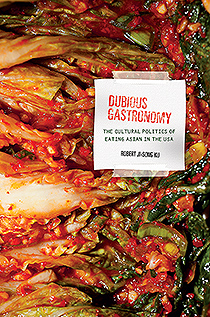 Dubious Gastronomy is the inaugural title in the Food in Asia and the Pacific series—
Dubious Gastronomy is the inaugural title in the Food in Asia and the Pacific series—
California roll, Chinese take-out, American-made kimchi, dogmeat, monosodium glutamate, SPAM—all are examples of what Robert Ji-Song Ku calls “dubious” foods. Strongly associated with Asian and Asian American gastronomy, they are commonly understood as ersatz, depraved, or simply bad. In Dubious Gastronomy, Ku contends that these foods are viewed similarly to Asians in the United States, in that the Asian presence, be it culinary or corporeal, is often considered watered-down, counterfeit, or debased manifestations of the “real thing.” The American expression of Asianness is defined as doubly inauthentic—as insufficiently Asian and unreliably American when measured against a largely ideological if not entirely political standard of authentic Asia and America.
In critically considering the impure and hybridized with serious and often whimsical intent, he argues that while the notion of cultural authenticity is troubled, troubling, and troublesome, the apocryphal is not necessarily a bad thing: The dubious can be and is often quite delicious.
Exhibiting the Past Examines Exhibitionary Spaces in Postsocialist China
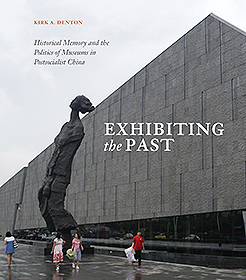 In Exhibiting the Past: Historical Memory and the Politics of Museums in Postsocialist China, Kirk Denton analyzes types of museums and exhibitionary spaces: from revolutionary history museums, military museums, and memorials to martyrs to museums dedicated to literature, ethnic minorities, and local history. He discusses red tourism—a state sponsored program developed in 2003 as a new form of patriotic education designed to make revolutionary history come alive—and urban planning exhibition halls, which project utopian visions of China’s future that are rooted in new conceptions of the past. Denton’s method is narratological in the sense that he analyzes the stories museums tell about the past and the political and ideological implications of those stories.
In Exhibiting the Past: Historical Memory and the Politics of Museums in Postsocialist China, Kirk Denton analyzes types of museums and exhibitionary spaces: from revolutionary history museums, military museums, and memorials to martyrs to museums dedicated to literature, ethnic minorities, and local history. He discusses red tourism—a state sponsored program developed in 2003 as a new form of patriotic education designed to make revolutionary history come alive—and urban planning exhibition halls, which project utopian visions of China’s future that are rooted in new conceptions of the past. Denton’s method is narratological in the sense that he analyzes the stories museums tell about the past and the political and ideological implications of those stories.
Focusing on “official” exhibitionary culture rather than alternative or counter memory, Denton reinserts the state back into the discussion of postsocialist culture because of its centrality to that culture and to show that state discourse in China is neither monolithic nor unchanging. The book considers the variety of ways state museums are responding to the dramatic social, technological, and cultural changes China has experienced over the past three decades.
Profile of Jazz Artist Gabe Baltazar Airs on Voice of America
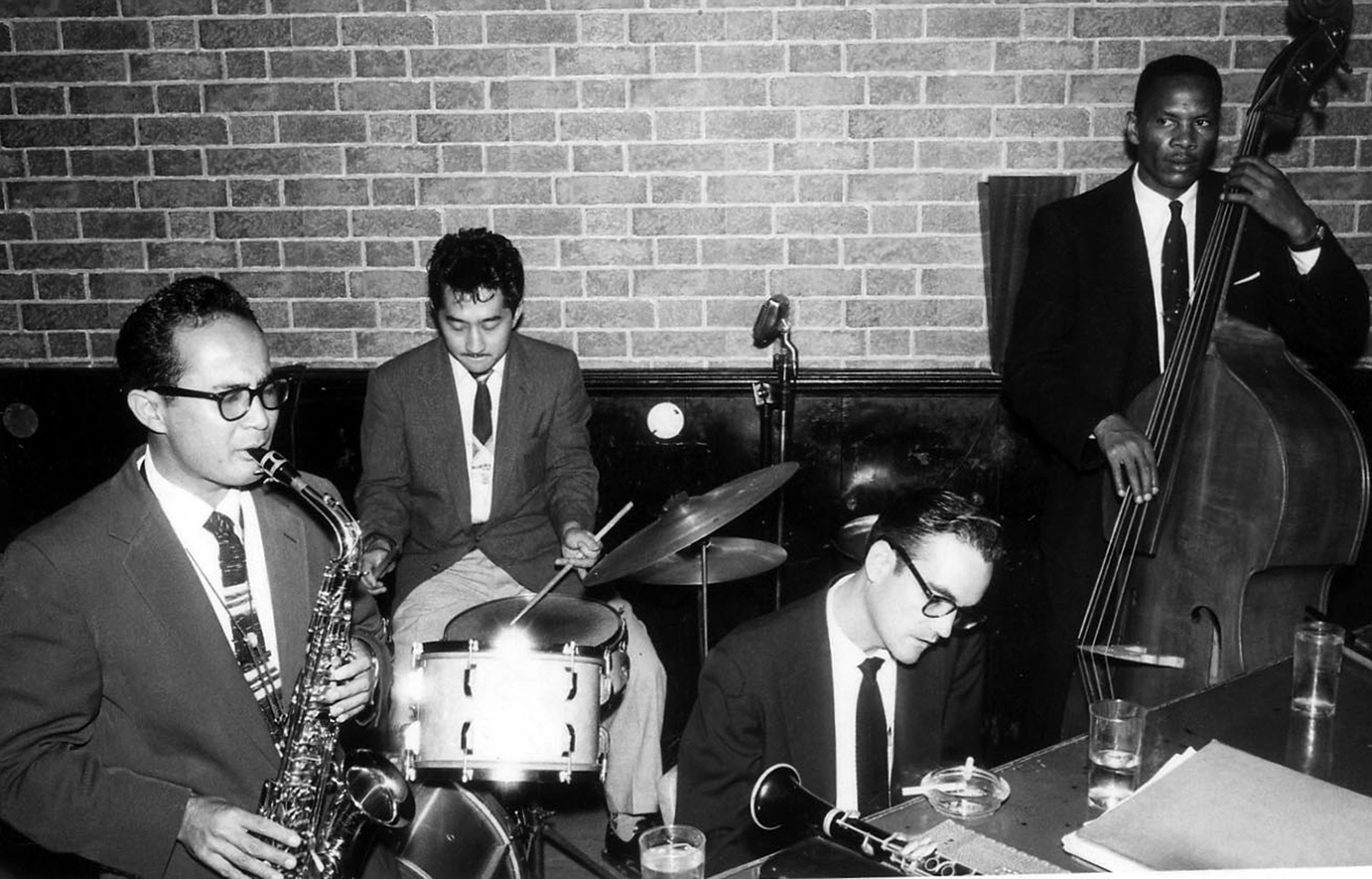
Broadcast journalist Heidi Chang‘s story on Gabe Baltazar Jr. as a pioneering Asian American jazz musician aired internationally on Voice of America. The show is archived on the VOA website; click here to read and listen (and comment!). It reveals just a sampling of what is in Gabe’s autobiography, If It Swings, It’s Music.
Philosophy East and West, vol. 64, no. 1 (2014)
ARTICLES
What Can Activist Scholars Learn from Rumi?
Radha D’Souza, 1
The neoliberal restructuring of higher education everywhere is accompanied by a distinctive branch of knowledge known as activist scholarship. Drawing from a number of disciplines including education, sociology, social anthropology, social theory, law, and human rights, activist scholarship proclaims as its core mission Marx’s imperative that philosophy should transform the world. Activist scholars affirm human emancipation as the goal of scholarship and set themselves the task of building bridges between theory and practice. There is a spectrum of views on the theory-practice nexus. Regardless, they all share certain common grounds that affirm (1) a nexus between theory and practice; (2) a relationship between knowledge and action; (3) knowledge as a condition for emancipation and freedom; (4) the affirmation of love and solidarity for social change; (5) the importance of everyday life; and (6) the role of the activist scholar in social change. These themes form part of a long and entrenched tradition in dissident Eastern philosophies, in particular the poet-saint traditions. Here each of the themes in activist scholarship is interrogated using the works of Mawlana Jalal al Din Rumi, the thirteenth-century Persian poet. What can activist scholars learn from Rumi?
Continue reading “Philosophy East and West, vol. 64, no. 1 (2014)”
China Review International, vol. 19, no. 1 (2012)
FEATURES
“Visiting Humanists” and Their Interpreters: Ricci (and Ruggieri) in China (reviewing Ronnie Po-Chia Hsia, A Jesuit in the Forbidden City: Matteo Ricci 1552–1610)
Reviewed by Elisabetta Corsi, 1
Who Was Homer Lea (1876–1912) and Why Should We Care? Myth and History in the “American Century” (reviewing Lawrence M. Kaplan, Homer Lea: American Soldier of Fortune)
Reviewed by Roger R. Thompson, 9
Whose Hong Kong? Views and Movements Local and Global (reviewing Stanley S. K. Kwan with Nicole Kwan, The Dragon and the Crown: Hong Kong Memoirs; Janet W. Salaff, Siu-lun Wong, and Arent Greve, Hong Kong Movers and Stayers: Narratives of Family Migration; Leo Ou-fan Lee, City between Worlds: My Hong Kong)
Reviewed by Ming K. Chan, 23
Continue reading “China Review International, vol. 19, no. 1 (2012)”
China Review International, vol. 18, no. 4 (2011)
FEATURES
The Life and Death of an Artisan Community in Modern China (reviewing Jacob Eyferth, Eating Rice from Bamboo Roots: The Social History of a Community of Handicraft Papermakers in Rural Sichuan, 1920–2000)
Reviewed by Pauline Keating, 429
From Secularization to Categorization: A New Paradigm for the Study of Religion in Modern China (reviewing Vincent Goossaert and David A. Palmer, The Religious Question in Modern China)
Reviewed by J. Brooks Jessup, 432
A New View of the Huainanzi (reviewing John S. Major, Sarah A. Queen, Andrew S. Meyer, and Harold D. Roth, translators, The Huainanzi: A Guide to the Theory and Practice of Government in Early Han China)
Reviewed by Nathan Sivin, 436
Continue reading “China Review International, vol. 18, no. 4 (2011)”
Biography, vol. 36, no. 3 (2013)
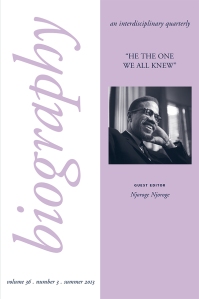 DEDICATION
DEDICATION
In Loving Memory: Jayne Cortez, iii
EDITOR’S INTRODUCTION
“He the One We All Knew”
Njoroge Njoroge, 485
This issue is dedicated to an examination of the life and thought of El-Hajj Malik El-Shabazz. The contributors explore different facets of the biography, legacy, and memory of Malcolm X and his relevance to contemporary politics. By introducing new research and building on previous scholarship, this volume seeks to expand and elaborate upon the complicated life narrative of the man we know as Malcolm X.
Continue reading “Biography, vol. 36, no. 3 (2013)”
Beyond Ainu Studies: Changing Academic and Public Perspectives
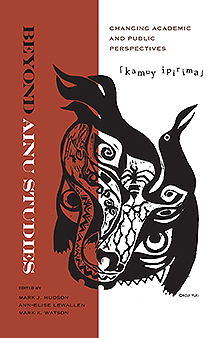 In 2008, 140 years after it had annexed Ainu lands, the Japanese government shocked observers by finally recognizing Ainu as an Indigenous people. In this moment of unparalleled political change, it was Uzawa Kanako, a young Ainu activist, who signalled the necessity of moving beyond the historical legacy of “Ainu studies.” Mired in a colonial mindset of abject academic practices, Ainu Studies was an umbrella term for an approach that claimed scientific authority vis-à-vis Ainu, who became its research objects. As a result of this legacy, a latent sense of suspicion still hangs over the purposes and intentions of non-Ainu researchers.
In 2008, 140 years after it had annexed Ainu lands, the Japanese government shocked observers by finally recognizing Ainu as an Indigenous people. In this moment of unparalleled political change, it was Uzawa Kanako, a young Ainu activist, who signalled the necessity of moving beyond the historical legacy of “Ainu studies.” Mired in a colonial mindset of abject academic practices, Ainu Studies was an umbrella term for an approach that claimed scientific authority vis-à-vis Ainu, who became its research objects. As a result of this legacy, a latent sense of suspicion still hangs over the purposes and intentions of non-Ainu researchers.
This major new volume seeks to re-address the role of academic scholarship in Ainu social, cultural, and political affairs. Placing Ainu firmly into current debates over Indigeneity, Beyond Ainu Studies provides a broad yet critical overview of the history and current status of Ainu research.
Cross-Currents: East Asian History and Culture Review, vol. 2, no. 2 (2013)
ARTICLES
Urban Chinese Living
Editor’s Introduction
Guest Editor Wen-hsin Yeh (University of California, Berkeley), 211
“Urban Chinese Living” speaks to a vibrant field of research in recent years. The essays grouped here examine aspects of Tianjin, Shanghai, and Chongqing in the late nineteenth and early twentieth centuries. They build on what we know of these cities in history and expand on the conception of the city as a particular site of discourse formation.
Continue reading “Cross-Currents: East Asian History and Culture Review, vol. 2, no. 2 (2013)”
Gender and Law in the Japanese Imperium
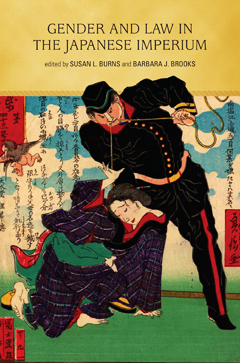 Arguing against the popular stereotype of Japan as a non-litigious society, an international group of contributors from Japan, Taiwan, Germany, and the U.S. explores how in Japan and its colonies, as elsewhere in the modern world, law became a fundamental means of creating and regulating gendered subjects and social norms in the period from the 1870s to the 1950s. In Gender and Law in the Japanese Imperium, the authors suggest that legal discourse was subject to negotiation, interpretation, and contestation at every level of their formulation and deployment.
Arguing against the popular stereotype of Japan as a non-litigious society, an international group of contributors from Japan, Taiwan, Germany, and the U.S. explores how in Japan and its colonies, as elsewhere in the modern world, law became a fundamental means of creating and regulating gendered subjects and social norms in the period from the 1870s to the 1950s. In Gender and Law in the Japanese Imperium, the authors suggest that legal discourse was subject to negotiation, interpretation, and contestation at every level of their formulation and deployment.
With this as a shared starting point, they explore key issues such reproductive and human rights, sexuality, prostitution, gender and criminality, and the formation of the modern conceptions of family and conjugality, and use these issues to complicate our understanding of the impact of civil, criminal, and administrative laws upon the lives of both Japanese citizens and colonial subjects. The result is a powerful rethinking of not only gender and law, but also the relationships between the state and civil society, the metropole and the colonies, and Japan and the West.
Japanese Government Honors Dr. George Tanabe with Imperial Order of the Rising Sun
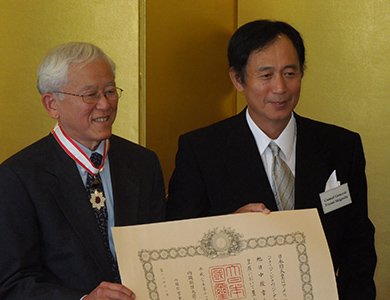
On January 24 at a ceremony at the Honolulu Consulate General of Japan, University of Hawai‘i professor emeritus George J. Tanabe, Jr. was conferred with the Government of Japan’s Imperial Order of the Rising Sun, Gold Rays with Neck Ribbon, in honor of his contributions toward the strengthening of academic and cultural exchanges between the United States and Japan. The award recognizes his work in promoting Japanese culture and values through research and studies in Japanese religions.
Dr. Tanabe joined the faculty of the Department of Religion at UH Mānoa in 1977 and served as department chair from 1991 to 2001. Among his titles published by UH Press are Japanese Buddhist Temples in Hawai‘i: An Illustrated Guide, which he wrote and researched with his wife Dr. Willa Tanabe, and Practically Religious: Worldly Benefits and the Common Religion of Japan, co-authored with Ian Reader. He is also general editor for the Topics in Contemporary Buddhism series.
For more information on Dr. Tanabe’s accomplishments, read the announcement on the award issued by the Consulate General.





